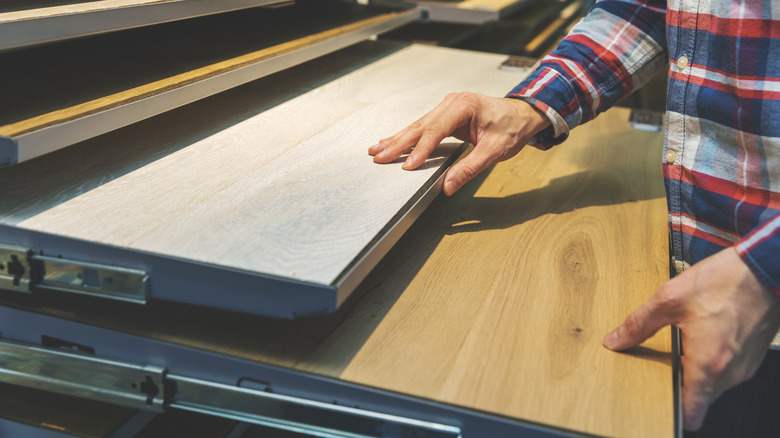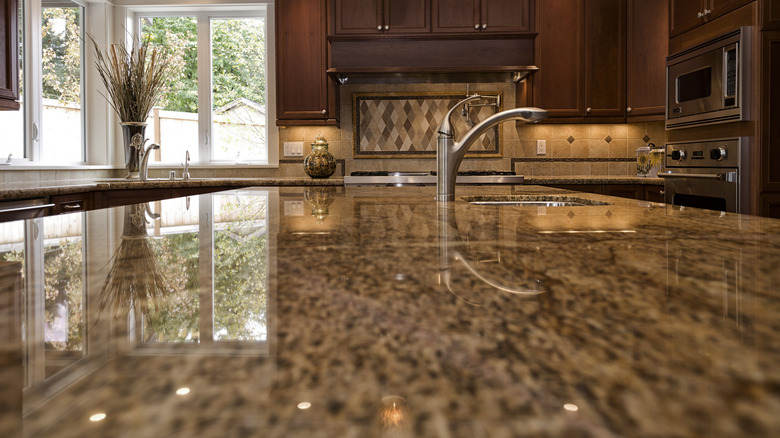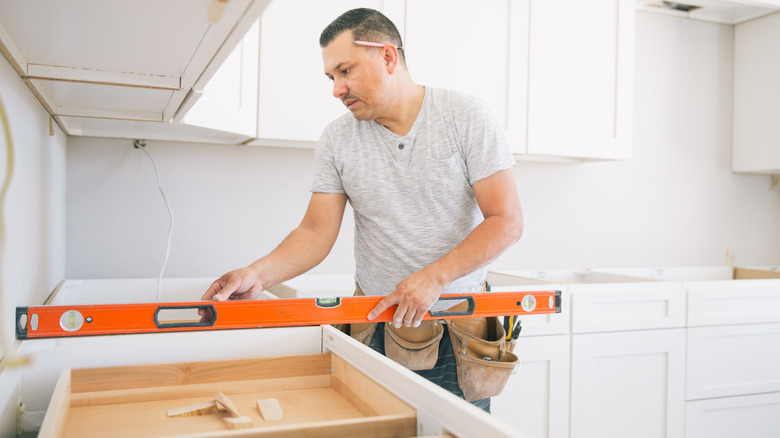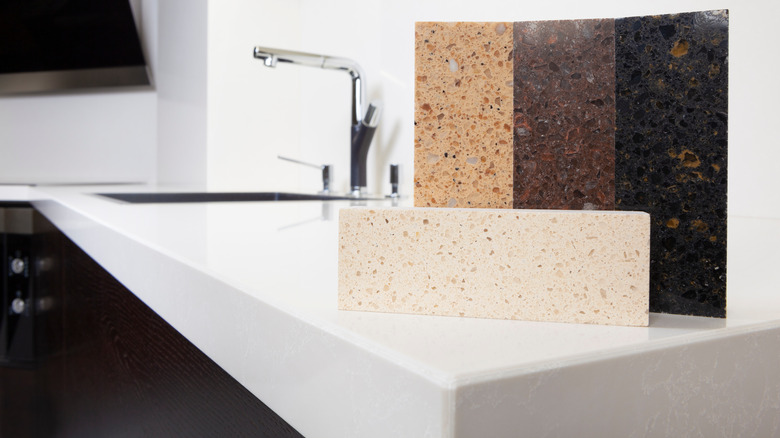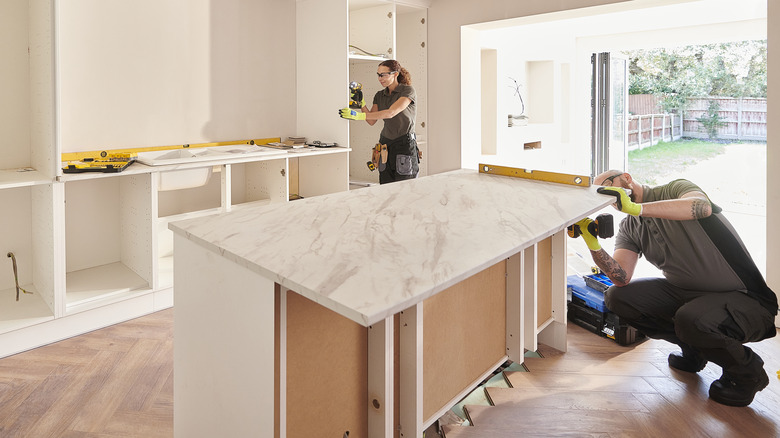Crucial Mistakes You're Making When Choosing Countertops For Your Home
When beginning a kitchen remodel, the countertops are one of the most central aspects to consider. You'll see these surfaces first when you walk into your new space, and they can completely affect the design of the rest of the kitchen. They also need to be sturdy, easy to clean, and reliable. However, choosing countertops can be a difficult process. There are a lot of things to consider, and unfortunately, a lot of places where you can go wrong.
What type of material do you need? How do you measure the space? What type of edging do you want? These are just some of the questions you need to ask yourself before making any decisions about your kitchen work surface. After all, you want your new space to look amazing, last for years, and fit your family's exact needs. This guide will help you avoid some common pitfalls as you begin the design and installation process.
Not creating a color palette
As you consider your remodel and decide how you want your kitchen to look, choosing a color palette is essential. You want to make sure that every element in the room fits together, including the floors, cabinets, hardware, walls, and of course, the countertops. If you choose a dark, cool-toned surface for your counters, but have bright, warm cabinets, your new kitchen will look unbalanced. People often forget about the tiny details like the color of your faucet or the undertones of the backsplash. Every detail matters, and a color palette can help guarantee that everything will match in the end.
In order to choose your color scheme, start by noting down the colors of any elements that won't change with the project, like the floors or appliances. If there are any new colors you've already chosen, add them to the palette as well. Once you have a good idea of the other colors in the kitchen, you can bring those along to your countertop consultation to make sure your choice matches. You can go to a home improvement store and gather paint samples to represent your colors or use a color palette generator like Coolors to create a good visual.
Disregarding a budget
Once you have an idea of the colors you want, you need to nail down a budget. Far too often, people forget to consider all the costs associated with a countertop replacement and end up paying much more than they planned. Another common mistake is pinpointing the budget too late. If you choose a material before deciding on a price point, you could find yourself having to reconsider your decisions. And finally, you need to discuss your thoughts with your contractor. If you don't make sure that everyone is on the same page with your cost expectations, you could be in for a surprise.
A basic guideline to get started is that your countertops should be about 10 percent of your total kitchen renovation costs. Of course, the exact ratio is up to you and can be much cheaper or more expensive depending on your priorities. When you're creating your budget, you need to write down every element that you'll need to replace or spend money on. Then, factor in a margin of error for unexpected costs. Unfortunately, you will likely spend more than you expect when all is said and done, so make sure that you give yourself some wiggle room.
Ignoring the durability of materials
Once you've settled your budget and your color scheme, the next big decision you need to make is material. You can choose a countertop made of natural stone, cement, wood, laminate, or manmade stone. However, if you choose solely based on looks, you could end up with a countertop that lasts far less than the rest of your kitchen. You need to account for high temperatures, water splashes, and general wear and tear. The key is to find a balance between durability, cost, and appearance.
Laminate is one of the cheapest materials you can use, but it only lasts around 20 to 30 years. In contrast, natural stones like granite and quartz can last over 50 years but are more expensive in the initial investment. Wooden countertops can last a long time if you use hardwoods and practice proper upkeep, but softwoods might not last long compared to other options.
To choose a countertop, you need to consider what your biggest concern is. Do you want to be able to set hot things directly on the counter? Are you okay with resealing your granite countertop every few years? Based on your level of commitment, you can narrow down which material you want to use.
Getting your measurements wrong
Perhaps one of the areas where mistakes are most likely to happen is in taking measurements. There are a lot of elements to measure when you are calculating just how much surface area you need to cover. In addition, people often make the mistake of forgetting to calculate the total square footage in addition to linear measurements. Even if you hire professionals for this step, it's important to have the same contractors measure and install, or else you could run into problems.
The best way to be accurate in your measurements is to draw a diagram of your kitchen layout. Then, as you measure, note the number on your diagram in the correct place. Another tip for measuring countertops is to measure from wall to wall instead of measuring the countertops that are already installed. The small gaps at the edges do matter and can lead to an ill-fitting workspace if you don't account for them. Be sure to account for any changes to your sink, range, and any other features involved in your project. Your new ones may have reduced footprints that will impact the overall countertop size.
Forgetting to consider care requirements
This common mistake goes hand in hand with durability. The reality is that any type of countertop will last longest if it receives proper care. Therefore, when you are considering durability, you need to also consider the level of care you're up for. For example, if you buy a wooden counter but aren't willing to oil the surface and keep it dry, it won't last. If you choose granite because of its durability but don't ever reseal the top, it won't look great for as long as possible.
The best way to avoid this mishap is to research the care needs of your specific choice. For example, marble needs to be cleaned immediately after spilling anything acidic, like lemon or vinegar, or it could ruin the surface. Granite needs to be routinely resealed to maintain stain resistance, and laminate cannot be cleaned with harsh abrasives or steel wool. Wooden countertops can be easily stained and need to be dried and oiled regularly. So before making a choice, consider which cleaning and care tasks you're willing and able to do, both on a day-to-day basis and in the long run.
Missing out on the tiny details
Once you have the color, material, and size determined, you might think that you are done making decisions about your countertops. However, there are many smaller details that you need to consider. Forgetting to think ahead about these could lead to a rushed decision that you'll regret later. Or, in some cases, the contractors could make a decision without consulting you and go with a default option you might not like. If you are putting in the investment of a new kitchen, you definitely want to love the outcome!
So, what are the additional elements you need to consider? One of the main details is edging. Your countertop edges can be straight, eased with a slight curve, bullnose with a half circle, half bullnose, beveled with an angle, or cove with a concave curve. You'll also need to make a choice on the thickness of the material. And, importantly, you need to consider joining. If your countertop isn't going to be one solid slab, you need to think about where the two surfaces will meet and make sure this joining point is as seamless as possible. Make sure to talk to your contractors to ask them for any other micro-decisions to consider.
Not researching your contractors
No matter how much planning and careful consideration you do, perhaps the most important aspect of countertop renovation is the installation. It could be a mistake to cut corners by trying to install it yourself or by hiring someone who does not have adequate experience. It's wise to have your contractor come by for a consultation and to confirm your measurements before you make any design decisions.
When hiring a contractor, you want to look for someone who specializes in the material you choose. An expert in installing granite may not do the best job at installing a wooden worktop. When searching, be sure to read reviews and look at pictures of their previous work. It's also a good idea to meet with several different contractors, so you can ask them about their experience and really make sure that they'll be a good fit before you commit. After all, the quality of their work will impact your entire kitchen design.
